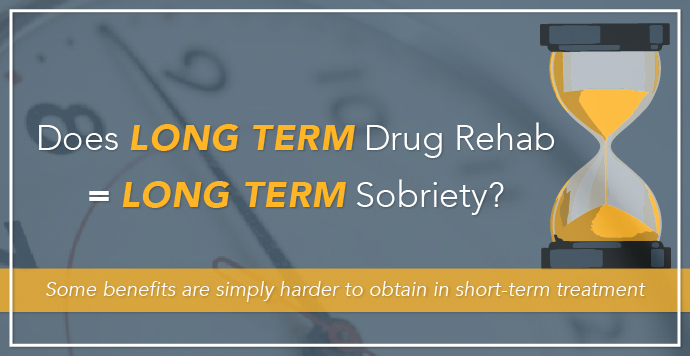
Short-term rehab has often been the choice for many people who wanted a quick return to sobriety, but a 2014 case in Pennsylvania forced one family to push for something called “Anthony’s Act,” a law that was to make 90-day (or long-term) rehabilitation the minimum length of stay. But does long-term drug rehab really equal long-term sobriety?
The Benefits Of Long-Term Rehab
Repeated studies have shown that long-term rehab is the most effective way for a person to achieve long-time sobriety. This doesn’t discount the effectiveness of short-term rehabilitation in certain cases. But relapse rates fall heavily when a person spends more time working on their addiction recovery treatment.
Why is long-term rehab more effective? Simply put, it gives you more time to address the concerns that lead to drug addiction. In shorter programs, more than half of your stay is dedicated to treating physical addiction through detoxification. This leaves less time to work on the psychological and behavioral aspects, which are often the hardest things to change.
In a long-term rehab program, detoxification will take up only 10-14 days of your 90-day (or more) visit. As a result, you’ll devote over two months learning more about your addiction and undergoing treatments as diverse as:
- Personal counseling
- Massage therapy
- Cognitive behavioral therapy (CBT)
- The 12-Step program
- Wilderness rehab
- Replacement medicine therapy
The best part about long-term rehab is that it gives you time to fine-tune your treatment and choose the best option for your needs. So if you are struggling to make headway in personal counseling, you can adjust to group counseling or even a cognitive behavioral therapy treatment. In fact, you may even be able to combine multiple methods for a more holistic treatment.
Relapse Doesn’t Necessarily Indicate Treatment Failure
Anti-rehabilitation groups often point to relapse statistics as an example of treatment failure. And it is true that a certain percentage of people treated for drug addiction will suffer from a relapse. This is true even of long-term rehab, though the relapse numbers are usually much lower than with short-term rehab treatments.
The truth is, relapses are a difficult thing for any person in recovery to avoid. After all, their addiction doesn’t disappear simply because they finish rehab. Instead, they’ve cleaned their body of the offending substance and learned new ways to fight cravings and dependency. All through their life, they will face moments of temptation.
Sometimes, these moments will be too difficult to handle. And while relapse isn’t inevitable, it can happen to anyone, regardless of their treatment length stay. However, rehabilitation helps teach them to understand the nature of relapse and how to pull out of the spiral more quickly.
Learning these lessons over an extended period of time helps a person reinforce coping strategies and recovery methods that help minimize the damage caused by relapse. In that way, relapse isn’t a failure, but a way for a person to prove their strength in recovery. And that strength will only be reinforced through long-term rehab stays.
Long-Time Recovery Requires A Life-Long Investment
Long-term rehabilitation puts you in the best position for long-term recovery by teaching and reinforcing the tools you need to fight cravings and recover from relapses. Short-term rehab is useful for learning the basics of the process or reinforcing these lessons later in life. However, long-term rehab gives you more time to practice these methods and master them.
It also gives you access to crucial aftercare designed to help strengthen your commitment and your new coping skills. It can also help place you in a half-way or three-quarter-way house and even find you a job after you leave treatment. These benefits are harder to obtain in short-term treatment.
Learn More
 While no rehabilitation treatment is without its drawbacks, long-term rehab has been shown, time and time again, to be the most effective way to learn the coping mechanisms required for a drug-free life. If you or someone you love if suffering from a difficult addiction, please contact us at DrugRehab.org. We can help you find a rehab center near you that can get you back on the right track.
While no rehabilitation treatment is without its drawbacks, long-term rehab has been shown, time and time again, to be the most effective way to learn the coping mechanisms required for a drug-free life. If you or someone you love if suffering from a difficult addiction, please contact us at DrugRehab.org. We can help you find a rehab center near you that can get you back on the right track.
